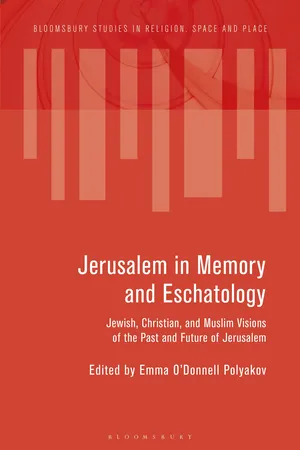
Jerusalem in Memory and Eschatology
Jewish, Christian, and Muslim Visions of the Past and Future of Jerusalem
- 257 pages
- English
- PDF
- Available on iOS & Android
Jerusalem in Memory and Eschatology
Jewish, Christian, and Muslim Visions of the Past and Future of Jerusalem
About this book
Investigating a range of eschatological ideologies, this volume explores the connection
between notions of sacred space and time in Jewish, Christian, and Muslim understandings
of Jerusalem. The recognition of Jerusalem as a holy city both unites and divides Judaism, Christianity, and
Islam. While these three religious traditions share a reverence for the same ancient city, this
veneration leads more often to tension and violence than to commonality and cooperation. Each of these religions draws heavily from religious memory and eschatological prophecies,
and sees Jerusalem as a site of past and future upheaval; however, the distinctions in their
visions imbue Jerusalem with meanings that reinforce conflicting and contested ideologies.
Offering multiple analyses of religious interpretations of the city and its sacred sites, this
volume explores these divergent visions of the remembered and anticipated Jerusalem.
Frequently asked questions
- Essential is ideal for learners and professionals who enjoy exploring a wide range of subjects. Access the Essential Library with 800,000+ trusted titles and best-sellers across business, personal growth, and the humanities. Includes unlimited reading time and Standard Read Aloud voice.
- Complete: Perfect for advanced learners and researchers needing full, unrestricted access. Unlock 1.4M+ books across hundreds of subjects, including academic and specialized titles. The Complete Plan also includes advanced features like Premium Read Aloud and Research Assistant.
Please note we cannot support devices running on iOS 13 and Android 7 or earlier. Learn more about using the app.
Information
Table of contents
- Half Title
- Series Page
- Title Page
- Copyright Page
- Contents
- Contributors
- Part I: Introduction
- Part II: Visions of Time: Memory and Eschatology
- Part III: Visions of Place: Contemporary Conflicts
- Part IV: Conclusion
- Notes
- Bibliography
- Index